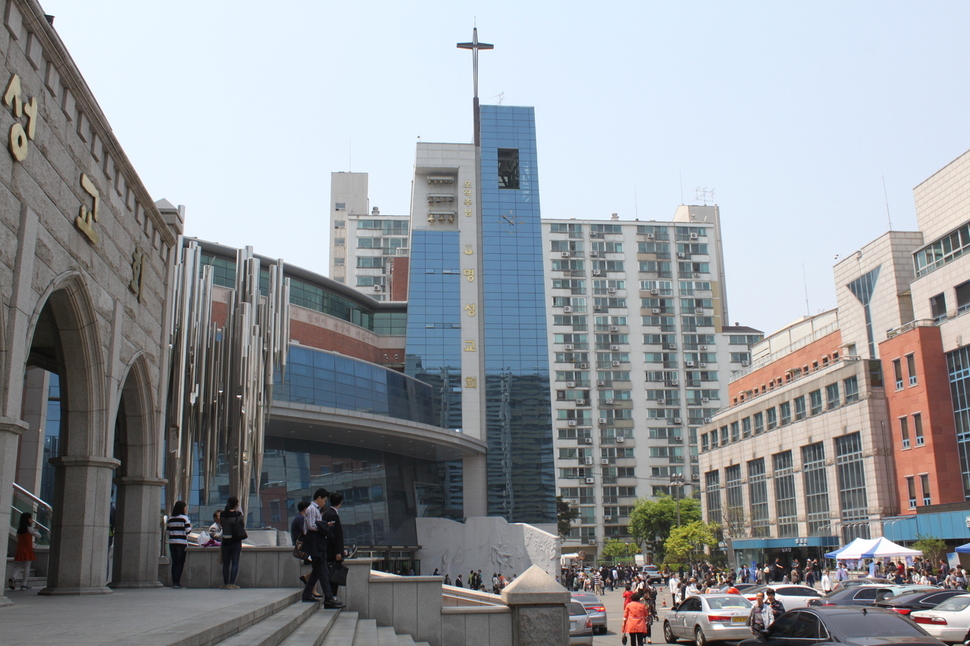 |
|
Myungsung Church, one of South Korea’s largest Christian churches, in Seoul’s Gangdong District.
|
National Assembly passes revision to income tax law on religious clergy
Just one year after a five-year debate finally ended with the adoption of a tax on members of the clergy in January 2018, the law is set to be diluted.
On Mar. 29, a revision to the Income Tax Act was passed in a full session of the National Assembly’s Strategy and Finance Committee. This revision is set to limit the income tax on the severance paid to clerics, including ministers, monks and priests, to the time they worked since the act took effect in January 2018. These clerics will also be provided a refund for the taxes they already paid on their total amount of severance.
In its original form, the Income Tax Act stated that clerics must pay tax on the income received from their religious organization under the category of “miscellaneous income.” That’s a category of income that allows a high percentage of expenses to be deducted, ranging from 30% to 80%. The scope of the income subject to taxation was also strictly limited to exclude honorariums received from laypeople. There were already complaints that the clergy are receiving excessive favors compared to wage earners, whose income is an open book to the Korean tax authorities, and now the scope of their taxable severance pay is being greatly reduced just one year after the law took effect.
If the revised law passes the Legislation and Judiciary Committee in a vote scheduled for Apr. 4 and the floor of the National Assembly on Apr. 5, it will immediately take effect. That means that clerics’ taxable severance pay will be reduced by the ratio of their total period of service to their service since Jan. 1, 2018. If a clergyman who retired on Dec. 31, 2018, had served for a total of 10 years, for example, he would only be taxed for a tenth of his total severance pay.
The position of the Strategy and Finance Committee is that this revision is exempting clergy from the hardship of being taxed on severance pay accumulated before the clergy tax took effect and that it therefore doesn’t constitute a special privilege. According to this argument, it wouldn’t be equitable for a clergyman who resigned in December 2017 to not pay any income tax on his severance and for one who resigned in January 2018 to pay tax on all of his severance.
But there will almost certainly be pushback to politicians’ decision to give ground on the clergy tax, which took nearly half a century to put into effect. Lee Nak-seon, the inaugural director of the National Tax Service, argued in favor of taxing the clergy all the way back in 1968, but the debate continued until 2018, when the tax was finally implemented.
In a report reviewing the revision to the law, Park Sang-jin, an expert advisor for the Strategy and Finance Committee, recognized “the need to revise the law in light of the time when the clergy tax was implemented.” At the same time, Park also said that “the decision should be made as a matter of legislative policy in consideration of issues of equity that could arise because of differences between the income of members of the clergy and the income of ordinary taxpayers.” Park pointed out that questions might be raised about fairness, considering that office workers are taxed on their entire severance pay.
The Religious Transparency Center, a group that has been calling for taxation of members of the clergy, responded by issuing a statement that said, “The principles of constitutional equality and tax equality are being neutralized once again at the request of the religious community leading up to the parliamentary elections. The National Assembly needs to immediately suspend its attempt to change the Income Tax Act for the worse by giving special favors to clergy members.”
By Noh Hyun-woong, staff reporter
Please direct comments or questions to [english@hani.co.kr]







